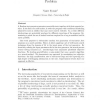Free Online Productivity Tools
i2Speak
i2Symbol
i2OCR
iTex2Img
iWeb2Print
iWeb2Shot
i2Type
iPdf2Split
iPdf2Merge
i2Bopomofo
i2Arabic
i2Style
i2Image
i2PDF
iLatex2Rtf
Sci2ools
104
click to vote
ENTCS
2006
2006
Concurrent Java Test Generation as a Search Problem
A Random test generator generates executable tests together with their expected results. In the form of a noise-maker, it seeds the program with conditional scheduling primitives (such as yield()) that may cause context switches. As a result different interleavings are potentially produced in different executions of the program. Determining a-priori the set of seeded locations required for a bug to manifest itself is rarely possible. This work proposes to reformulate random test generation of concurrent Java programs as a search problem. Hence, it allows applying a set of well known search techniques from the domain of AI to the input space of the test generator. By iteratively refining the input parameters fed to the test generator, the search process creates testing scenarios (i.e. interleavings) that maximizes predefined objective functions. We develop geneticFinder, a noise-maker that uses a genetic algorithm as a search method. We demonstrate our approach by maximizing two object...
Related Content
| Added | 12 Dec 2010 |
| Updated | 12 Dec 2010 |
| Type | Journal |
| Year | 2006 |
| Where | ENTCS |
| Authors | Yaniv Eytani |
Comments (0)

